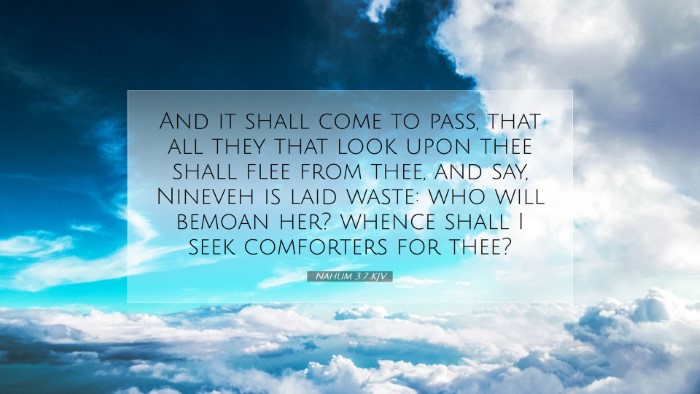Old Testament
Genesis Exodus Leviticus Numbers Deuteronomy Joshua Judges Ruth 1 Samuel 2 Samuel 1 Kings 2 Kings 1 Chronicles 2 Chronicles Ezra Nehemiah Esther Job Psalms Proverbs Ecclesiastes Song of Solomon Isaiah Jeremiah Lamentations Ezekiel Daniel Hosea Joel Amos Obadiah Jonah Micah Nahum Habakkuk Zephaniah Haggai Zechariah MalachiNahum 3:7
Nahum 3:7 KJV
And it shall come to pass, that all they that look upon thee shall flee from thee, and say, Nineveh is laid waste: who will bemoan her? whence shall I seek comforters for thee?
Nahum 3:7 Bible Commentary
Commentary on Nahum 3:7
Nahum 3:7 states: "And it shall come to pass, that all they that look upon thee shall flee from thee, and say, Nineveh is laid waste: who will bemoan her? whence shall I seek comforters for thee?" This verse is a poignant conclusion to Nahum's declaration against Nineveh, encapsulating its impending destruction and the desolation it brings.
Overview of Nahum's Prophecy
Nahum, a minor prophet in the Old Testament, articulates the impending doom of Nineveh, the capital of Assyria. His book is fundamentally a prophetic declaration of God's judgment against this powerful city, known for its cruelty and idolatry. The language is vivid and portrays the totality of their downfall, serving both as a warning and an encouragement to the people of Judah.
Analysis of the Verse
In Nahum 3:7, the imagery and expressions reveal profound theological insights about human response to divine judgment. The verse articulates two key themes: the terror of God’s judgment and the consequences of sin.
-
The Terror of God’s Judgment
Matthew Henry notes that the fall of Nineveh would evoke fear and flight among those who observe it. Their acknowledgment of Nineveh's desolation signifies an awareness of divine authority and the fearful reality that judgment can bring.
-
The Lament of the Nations
Albert Barnes highlights the lack of empathy for Nineveh's fate. The rhetorical question, "Who will bemoan her?", suggests that Nineveh's ruthless reputation leaves no one willing to mourn her downfall, reflecting how sin estranges a person from community and compassion.
-
Exile of Comforters
Adam Clarke points out that the absence of comforters illustrates the isolation brought about by judgment. When God's judgment falls, those who once stood in positions of power and pride find themselves abandoned, signaling the severity of their rebellion against God.
Theological Implications
This verse not only serves as a historical commentary on Nineveh but also resonates with contemporary applications. It posits several theological reflections for modern readers:
-
The Reality of Divine Judgment
Believers are reminded that God's justice will ultimately prevail. Just as Nineveh faced its consequences, all unrepentant hearts must confront the reality of God’s righteousness.
-
The Response to Sin
Nahum encourages a self-reflective examination of sin and its consequences. The downfall of Nineveh acts as a stark reminder of the severity of moral choices and the sovereign response of God against sin.
-
The Nature of Repentance
This verse invokes the need for sincere repentance and the dangers of relying on past successes or strength. Assyria’s fall beckons sinners to reconsider their paths and the pursuit of true restoration with God.
Pastoral Applications
For pastors, Nahum 3:7 offers powerful themes for sermons or teaching sessions:
-
Encouragement in Judgment
Pastors can confidently communicate that God is not indifferent to sin and injustice. Drawing from this verse, they can underline that divine judgment is a source of hope for those who suffer under oppression.
-
Hope for Restoration
Despite the devastation of Nineveh, the ultimate message of hope—in the larger canon of scripture—is that God is also a God of mercy who desires repentance and restoration in the hearts of His people.
-
Community Reflection
Pastors can encourage their congregations to reflect on their community dynamics, exposing the truths about sin that lead to isolation. By fostering a culture of confession and support, churches can embody the opposite of what Nineveh experienced.
Conclusion
The weighty message of Nahum 3:7 serves not just as historic comment but as a timeless reminder of the nature of God's justice and mercy. This verse challenges readers to grasp the depth of their relationship with God, the consequences of sin, and the beauty of repentance.
As theologians and scholars engage with these themes, they are urged to delve deeper into the text, drawing upon the rich insights from the commentaries of Matthew Henry, Albert Barnes, and Adam Clarke, to provide a comprehensive understanding of the implications for both ancient and modern contexts.


